- Home
- Linda Nagata
The Trials (The Red Trilogy Book 2) Page 5
The Trials (The Red Trilogy Book 2) Read online
Page 5
“I don’t know who sent the mercs,” I admit to Nolan. “Nothing about the operation makes sense to me. Carl Vanda might like to have me alive, but he would have used real bullets, and slammed the rest of you.”
Nolan reaches for his towel. “Yeah, it’s like whoever it was, they wanted to grab you, without really pissing you off.” We frown at each other and I know we’re both thinking about the dead merc. “I guess they kind of fucked that one up,” Nolan adds.
• • • •
My dress uniform is ruined, and anyway I think the FBI agents investigating the attack bagged it as evidence, so I put on my combat uniform. Then I’m escorted to the same consultation room where I spoke with the president. I get to spend the next ninety minutes with two FBI agents who insist on going over every second of the attack in excruciating detail even though they have video from the helmet cams of all four MPs, along with recordings made by cameras in the parking garage. They don’t ask about my overlay and I don’t volunteer the news that it switched on just moments before the explosion. My theory is that the fake FBI van was equipped with a relay already hacked by the Red. As I passed the door, it sensed me and automatically restored me as a node on its network—one more surveillance device among millions, made active again.
The FBI agents aren’t volunteering anything either. I ask about the attackers: who they were, who they worked for, what they had in mind for me, but I get no answers, and when it’s clear we’ve all decided not to talk, Sergeant Haffey escorts me back to my cell. “The local network’s been restored,” he tells me. “Guidance cleared it for use, so we’re not isolated down here anymore.”
I check my overlay. It’s still active, but I’m on lockdown as always, with no outside link. “Any confirmation on the status of Thelma Sheridan?”
He raises a ginger eyebrow. “You heard about that? It’s not good news for you, is it?”
“It’s not. Is it true?”
“The mediots act like it is, but since when do they know anything?”
I ask Major Ogawa the same question when he stops by in the midafternoon. Haffey allows him into the cellblock, but makes him stand outside the glass wall. I’m up on my feet as soon as I see him, facing him from the inside, wanting answers.
“I haven’t heard anything official on Sheridan, but that’s not your first concern.”
I don’t agree, but I have other questions. “So what happened this morning? Who the hell staged that fiasco? What were they after?”
He looks me in the eye. “Nothing happened this morning. Nothing you’ll ever be able to talk about. The incident has been classified.”
Just like the nuclear terrorism on Coma Day. We’ve got a pattern going here.
“Okay,” I say. “Why? Is it being buried because the FBI is embarrassed it ever happened? Or because they know who’s behind it?”
He shakes his head. “All I know is they want it hushed up. Colonel Monteiro demanded to know if any of you had the marks of a brawl on your face. If you did, she would have refused to proceed. As it is, it’s safer to go forward. The crowd on the Mall was tallied at two hundred twenty thousand today, and the mood got ugly when news broke that the court-martial was postponed. Smells like bullshit, you know? And no one wants a riot. So we’re going forward tomorrow. Opening arguments at ten hundred—”
“Assuming we get to the courtroom.”
“You’ll get there. The army can’t wait to put this case away.”
Major Ogawa isn’t kidding. At 1721, Sergeant Omer brings the news that a fresh set of dress uniforms has been delivered, one for everyone. There’s even a set of shoe inserts for me, so my robot feet can be properly attired. It’s a miracle of efficiency to speed the hour in which the Apocalypse Squad drops out of the daily cycle of viral news.
• • • •
After lights-out I’m lying in my bunk half asleep when an upload link opens in my overlay. Data streams out into the world. It takes several seconds, and then the link closes again. Just like always. The routine finishes with the deletion of yesterday’s video.
It’s standard operating procedure to have a security AI monitor traffic on any military network. That AI should be logging the nightly uploads. It should flag them if they aren’t authorized by Guidance, but no questions have ever been asked. I have a feeling there won’t be any questions about tonight’s activity either.
Got to admit: After last night’s isolation, it’s a relief to be in the Red’s network again.
• • • •
The next day we assemble again at the request of Master Sergeant Chudhuri. This time, uniformed soldiers wearing armor and carrying assault rifles are stationed everywhere along our route. Chudhuri says they’re on every floor and in the parking garage too. It makes her feel secure enough that she doesn’t suggest the stairs, allowing us to take the elevator to the fourth floor. Our handcuffs are removed, and then we wait in a conference room, all of us seated around a table.
I listen with interest as the squad gives me their perspective on yesterday’s incident.
“When Chudhuri ordered us to get down, we all dropped,” Harvey says. “She needed a clear field for shooting, right? But the mercs knocked her down with their toy ammo.”
“They knocked down all the MPs,” Tuttle adds. “We thought we were next. Nothing left to lose.”
Jaynie shifts, fixing me with a pointed gaze. “Is that what you were thinking when you went after that merc?”
“Something like that.”
Nolan says, “When you took her down, when the blood started, her partner froze. So me and Harvey tackled him, and Vasquez went after the weapon.”
“Stomped his fingers,” Jaynie says. “Broke them, I think. Anyway, he dropped the weapon, but Chudhuri was already up. She got her hands on it before I could.”
“She was so fucking pissed,” Moon says, wide eyed with the memory. “She pumped rounds point-blank into the merc’s chest armor—”
“To calm him down,” Harvey says. “That’s all.” She nods at me. “Then she followed you out the door.”
“It went so fast,” Flynn adds, “we didn’t even know they was shooting plastic till it was over.”
“We got lucky,” I tell her.
Harvey leans back in her chair, giving me a skeptical smile. “I don’t know about lucky, LT, but sure as shit, we’re better off than that merc you took apart. I did not know you could do that.”
Flynn starts to gush her admiration for what I did, but when the door opens, she breaks off in midsentence.
Chudhuri looks in, her expression somber behind the clear shield of her visor. “It’s time.”
• • • •
We enter the courtroom through a side door. I go first, with Jaynie behind me, and the others following in a line. According to Chudhuri’s security assessment, the chamber was hardened a few years ago to prevent transmission of radio and cell communications, leaving it isolated from the Cloud. The upgrade isn’t obvious. Gleaming maple panels line the walls, with the same wood used for all the furnishings.
The judge’s bench, with the witness stand, presides at the front of the room, against the backdrop of a high, curved wall. To the right of the bench sits the still-empty jury box. Close to the box, in front of the bar, is a small table where trial counsel wait: Major Adrienne Fong and Captain Elise Bowen, the two army officers assigned to prosecute our case. On the table in front of them are yellow legal pads and two electronic tablets.
The defendants’ table is on the left side of the room. It’s actually two long tables aligned in an L shape. Major Ogawa and my uncle Brandon Shelley stand at the end of the table closest to the center of the room. Two assistant military attorneys stand at the opposite end of the L, closest to the judge’s bench.
Behind the bar, the spectator seats are full. I see my dad in the first row, right behind the defendant
s’ table. He’s a handsome man, a few months shy of his fifty-third birthday, who has always been fond of dressing well. These days though, his face is gaunter than it used to be, and his hair is quickly going gray. As I file in, his gaze fixes on me, a haunted look in his eyes as if I’m already a ghost.
Shock hits as I realize who’s sitting with him: Lissa’s parents, Joe and Amy Dalgaard. I don’t want to look at them. I make myself do it anyway. I meet their eyes. I know what they’ve lost. I share the pain I see in both their faces. But they’re innocent. I’m not.
Major Ogawa signals me to stand aside, directing the others to file in behind the long defendants’ table. I pull Jaynie out of the line because I want her beside me, so it’s Nolan who leads the others to their seats—all but Harvey, who hangs back. With a dark look, she sends Tuttle, Flynn, and Moon ahead of her. Harvey likes to be close to the action, so she takes the seat next to Jaynie. Then it’s me, and then our lead attorneys.
I sit down. I don’t turn around. I’m not supposed to speak to anyone behind the bar . . . but I hear Mrs. Dalgaard’s whisper, “Bring the bastards down, Jimmy. Make them pay for everything they’ve done, and everything they failed to do. For Lissa.”
I turn to look at her, stunned to think she might be on my side. Tears shimmer in her eyes as she nods.
Under his breath, my uncle tells me, “Turn around and face the court.”
I do it, just as the bailiff calls, “All rise!”
• • • •
A panel of twelve officers known as the court members files into the jury box. Colonel Susan Monteiro enters next, wearing her judge’s robes. Monteiro is Caucasian, in her fifties, with a rosy flush in her cheeks and blond hair trimmed short in a feminine cut. She takes her seat behind the bench. To her right is a large American flag draped around a vertical pole. Mounted on the wall above her is a bronze medallion, three feet across, depicting an American eagle. Judge Monteiro surveys the courtroom with a congenial expression. Then she cocks her head to one side and asks the court members, “Shall we begin?”
When it’s agreed we are ready to start, her gaze shifts to the table occupied by trial counsel. “Government, do you have an opening statement to present to the court?”
Major Fong stands. “Yes, Your Honor.”
“Then please proceed.”
Major Fong steps away from the prosecution’s table. She’s a woman of moderate height. Her figure reflects the gathering thickness of middle age, giving her a sturdy dignity as she turns in her immaculate Class A’s to face the officers seated in the jury box.
The function of the court members is the same as that of a civilian jury: to find a verdict. They are all either majors or captains. Major Fong addresses them with an opening strike that takes me by surprise. “We are in the presence of heroes,” she says in a hushed, respectful tone. She half turns, her hand palm-up in a graceful gesture that takes in me and everyone else at the defendants’ table. “These seven defendants before us today—Private Mandy Flynn, Specialist Jayden Moon, Specialist Samuel Tuttle, Specialist Vanessa Harvey, Sergeant Aaron Nolan, Sergeant Jayne Vasquez, and Lieutenant James Shelley—are all heroes, rightfully honored by a grateful nation for the extent of their service and for the remarkable actions they undertook on the night of November eleventh, when this country faced a crisis the equal of any we have known in our history. Every one of them is a hero of the action at Black Cross.”
She turns away from us, to address directly the panel of officers in the jury box. “It’s a tragedy of human nature that heroes can sometimes become larger than life, even in their own eyes. This case does not turn on venal behavior or greed. No, it is a case founded on the arrogance of heroes who came to believe too deeply in their own righteousness.
“This is a case about what happens when good soldiers, acting on limited information, are persuaded to take the law into their own hands. We will show that they conspired together and undertook the brutal abduction and illegal incarceration of Thelma Sheridan, an American citizen neither accused nor convicted of any crime, and we will further show that in the course of this action they murdered four employees of Vanda-Sheridan, and compelled the service of Vanda-Sheridan pilot Ilima LaSalle. This was the so-called First Light mission, which took place from November eighteenth through November twentieth.
“The evidence the government intends to present will show that every one of the defendants knew without doubt the actions they took against Ms. Sheridan and her employees were illegal, that the actions of the First Light mission violated the sovereignty of the United States, and that the defendants expected to face a court-martial for their role.
“The government will also show how the actions of Colonel Steven Kendrick, now deceased, initiated the events that led to this court-martial.
“Primary among the evidence the government will present is the video library compiled by the defendants themselves, documenting the events of November eighteenth through twentieth, and turned over as evidence by defense counsel.
“Another key piece of evidence is a video deposition of Thelma Sheridan, who is prevented from acting as a witness in this court due to her continued incarceration.”
I feel Jaynie tense beside me. I turn to meet her gaze. We’re both wondering the same thing: Did trial counsel just say that Sheridan is still alive? Jaynie raises an eyebrow as if to say, Maybe, maybe, while Major Fong continues to speak:
“The government would like to note two key witnesses we’ll be calling during the proceedings.
“First, Blaise—a.k.a. Blue—Parker, presently in federal custody for his involvement in the nuclear terrorism of November eleventh. Mr. Parker will testify to events occurring at Black Cross that directly influenced the subsequent actions that concern us today.
“And another key witness is Special Agent Eve England, who will testify to discussions she held with Colonel Steven Kendrick following the events at Black Cross.
“We will also be hearing from expert witnesses, among them legal scholars testifying to the meaning and implications of a soldier’s service oath, and the limits of action inherent in that oath.
“The government is confident that after evidence is presented, you, the court members, will find that all seven defendants committed the offenses as charged.”
It is of course a kind of theater, and we are actors in a play whose script we helped to write. The evidence is already logged and reviewed. The witnesses are known, along with the testimonies they will deliver. Nothing is hidden. Nothing held back. It’s only the concluding verdict that’s unknown, and even that is fairly certain.
Major Fong nods to her co-counsel. Both seem satisfied with her presentation. She returns to her seat, while the judge’s attention shifts to Major Ogawa.
“Defense, will you present your opening statement at this time?”
“Yes, Your Honor.” Ogawa stands up, steps away from the table, and turns to the court members, this collection of officers in the jury box. He surveys them slowly. Then he says, “On the day you were inducted into the army, you took this oath: ‘I do solemnly swear that I will support and defend the Constitution of the United States against all enemies, foreign and domestic.’” He turns halfway, to look at us. “Every defendant seated before you today spoke this same oath. We will show that the actions taken by the defendants during the First Light mission were taken in defense of this oath.
“We will show that the nuclear terrorism of November eleventh spawned a criminal cover-up involving both government officials and military command. The defendants, through their heroic efforts at Black Cross, were aware of legitimate evidence strongly implicating Thelma Sheridan as a primary participant in the terrorist conspiracy. Lieutenant Shelley, a dedicated soldier who has time and again risked his life in defense of his country, was left with only one way to defend his oath of office.” Ogawa nods at me, and then he points to each of my soldiers, speaki
ng their names, “Vasquez, Harvey, Moon, Flynn, Tuttle, and Nolan. You’ve all heard of them. All of them are heroes of Black Cross whose oath of enlistment bound them to do what they did during the First Light mission. It was not a task they wanted. It was thrust upon them when individuals in authority, individuals within our government and within our command structure, abandoned their own duty to defend the Constitution of this country. First Light was a desperate attempt to secure the justice promised in our Constitution, a document that makes no allowance for exceptional privilege to the wealthy and the powerful. We will show that corruption in the ranks and in the government forced these loyal patriots to a foreign court to find the justice promised to us, but no longer available, under our constitutional system.”
What he says is true. We were forced to a foreign court, but if that foreign court allowed Thelma Sheridan to be murdered, then we will have failed to deliver her to justice—and after that, what defense do we have left?
Major Ogawa returns to his seat. I scan the panel of officers. A few faces look thoughtful, but most just present stonewall expressions. Everyone here is aware of the cameras recording these proceedings, and these officers know that both the attorneys and the media will be analyzing their facial expressions to weigh the effectiveness of the arguments. So most give away as little as they can.
The media will also be looking at us, the defendants, hunting for signs of fear, outrage, denial, approval—any hint of human emotion. And why not give them what they want? It would be the smart thing. It might get us sympathy from their audience, get the public on our side. But none of us do. It’s not our way. We listen, wearing the same emotionless expression as two-thirds of the jury.
The judge is the only one on this side of the bar who looks at ease. She weaves her fingers together, rests her chin on them, and gazes out at her courtroom. “Well. It’s nearly lunchtime. Shall we break until the afternoon?”
• • • •
Assistant trial counsel Captain Elise Bowen spends the opening hour of the afternoon session reading stipulations into the court record. These documents describe the basic sequence of events that took place during the initial hours of the First Light mission, ending at 0132 on November 19, when our C-17 lifted off from Alaska.

 Nightside on Callisto and Other Stories
Nightside on Callisto and Other Stories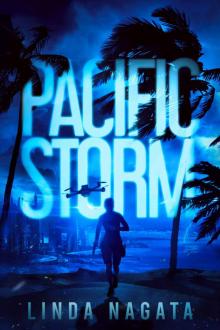 Pacific Storm
Pacific Storm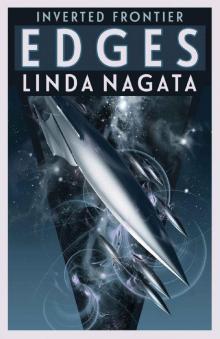 Edges
Edges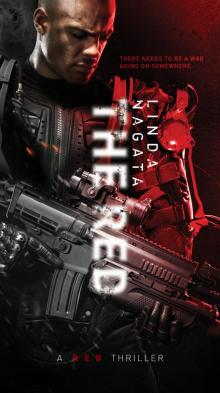 The Red
The Red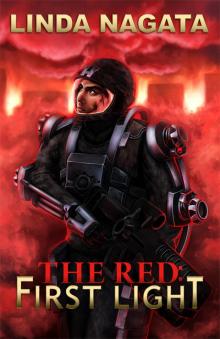 The Red: First Light
The Red: First Light The Martian Obelisk
The Martian Obelisk Limit of Vision
Limit of Vision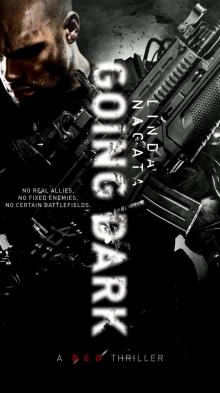 Going Dark
Going Dark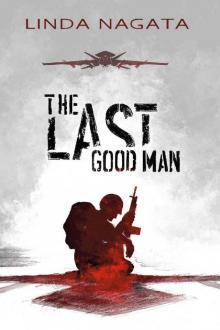 The Last Good Man
The Last Good Man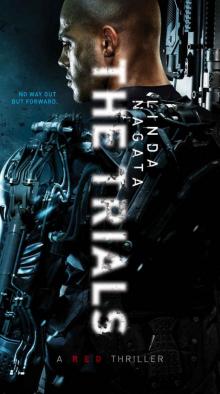 The Trials (The Red Trilogy Book 2)
The Trials (The Red Trilogy Book 2)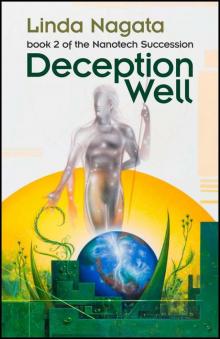 Deception Well (The Nanotech Succession Book 2)
Deception Well (The Nanotech Succession Book 2) The Year's Best Science Fiction & Fantasy 2013
The Year's Best Science Fiction & Fantasy 2013 The Dread Hammer
The Dread Hammer Skye Object 3270a
Skye Object 3270a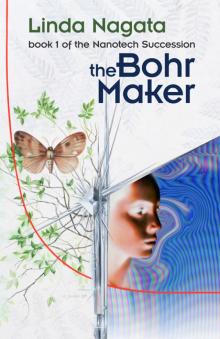 The Bohr Maker
The Bohr Maker